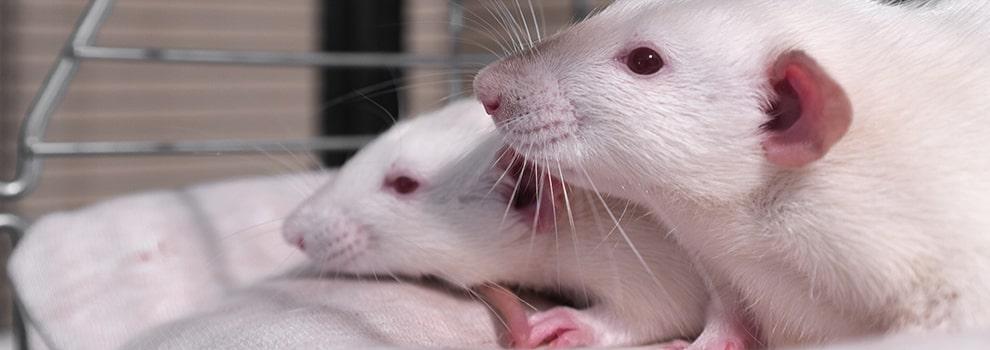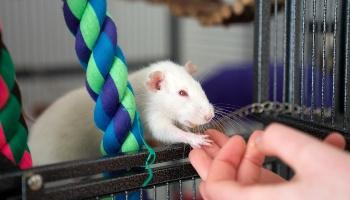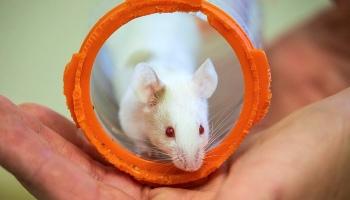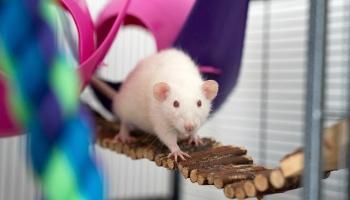Keeping Pet Rats Together - Introducing Rats | RSPCA - RSPCA
Introducing rats to each other
Pet rats should be housed together from a young age and should ideally be siblings. They should be kept in small same-sex groups and are perfectly happy without the opposite sex.
Remember:
- Separate young males and females as soon as possible after weaning so that they don't produce pups, which are difficult to find good homes for.
- You should only breed rats if you've already found good homes for all the pups.
- Always try to introduce cage-mates to one another soon after weaning (at three weeks old) as they'll fight less.
- Don't add or remove rats from a familiar group if possible, as this will disrupt stable social groups and can lead to aggression.
When adult rats who don't know each other are housed together there will be a period of high aggression, but this shouldn't last long and should drop once they establish a dominance relationship.
Fighting between cage-mates is rare, but you can spot it when:
- One rat hides from the other
- One rat injures another
- The attacking rat has raised fur
If newly introduced rats continue to be aggressive to each other, especially if one or more of them get hurt, this may show that they're unable to reach a stable dominance relationship and so shouldn't be housed together. Rats may suffer if they can't escape from others they don't like.
How to avoid aggression within a group of rats
You can help reduce aggression if you:
- Avoid disrupting stable social groups by permanently removing familiar rats, or adding unfamiliar rats, as this can be stressful
- Avoid anything that alters the smell of an individual as this may cause your rats to investigate their cage-mate more and could lead to unnecessary aggression
- Provide enough resources so that all rats can access them at the same time (such as food bowls, water dishes and hiding places) and don't have to share if they don't want to
- Provide multiple shelters and visual barriers to help break up aggressive encounters by enabling rats move away from each other
Having multiple levels in their home cage can also help act as barriers to aggression. Make sure that shelters have multiple exits to avoid particular rats stopping other cage-mates from leaving the shelter.
Signs a rat is being aggressive to the others
Aggressive grooming indicates social stress in groups of rats, as does strong vocalisation during an aggressive encounter.
If you see increased aggression in a group of usually stable rats, this could indicate that there is a problem. Check the health of your rats and that something hasn't changed in their cage. Monitor your rats carefully, as they can also show aggression towards their cage-mates when they're in pain. If you're concerned, ask your vet.
Consider separating your rats if one is hurt or frightened by the other and the problem lasts for more than a few days.
Protect your rats from other pets and animals
Mask the sounds, sights and smells of animals your rats may be afraid of, such as cats, dogs, ferrets and birds of prey. Rats are a prey species and these animals can cause them stress.
How to get rats used to being handled
Rats can build close relationships with you, and you can successfully train them. Start by having regular gentle and calm contact with your rat to slowly allow a bond to develop. Allow them to investigate your hands in their own time and reward them with treats to help them enjoy your company.
Remember:
- Rats like playing, especially when young - they take turns who wins and loses. They can learn to play with humans as well as other rats.
- Rats can find exposure to humans stressful until they've formed a positive relationship with you, so build this up gradually.
- Handle them in the morning or evening to avoid disturbing them in the daytime when they're sleeping.
How to pick up rats
Handling carefully and considerately, in a confident but gentle manner. Never pick rats up using their tails - this is stressful and can injure them.
When picking up your rat, let them sniff your hand before gently lifting them up, with one hand placed under the body and the other loosely over their back.
Never hold them at a height, as if they jump or fall they can injure themselves.




